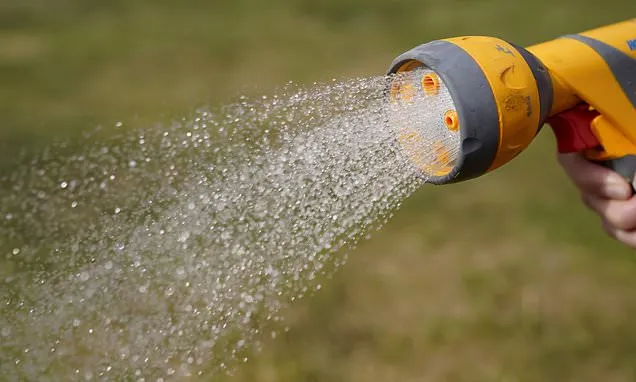Households in Yorkshire have become the first to be hit with a hosepipe ban after months of extremely hot and dry weather across England.
Yorkshire Water said restrictions on using hosepipes for activities such as watering the garden, cleaning cars and filling paddling pools will be brought in from Friday in an effort to protect supplies in the face of more dry weather forecast in the coming weeks.
Customers who ignore the hosepipe ban could face fines of up to £1,000, but the utility said "we hope it won't come to that" as it urged households to help conserve water by sticking to the restrictions.
The company said the region has experienced both the driest and warmest spring on record this year, receiving just 15cm of rainfall between February and June, less than half of what is expected in an average year.
There has also been a higher water demand, leaving the region's reservoirs at 55.8% full, which is 26.1% lower than they would normally be at this time of year.
England has experienced the hottest spring from March to May on record, and the driest in over a century, followed by the hottest June on record, with two searing heatwaves hitting parts of the country in the second part of the month and into July, and another set for some areas this week.
Experts warn human-caused climate change is driving increasingly extreme weather such as hotter drier summers, and making heatwaves such as those seen recently, which can push up water use just as supplies are scarce, more intense and frequent.
A drought was declared by the Environment Agency across Yorkshire in June, while the North West of England entered drought status in May - though the region's water company United Utilities said on Tuesday it had no plans to announce a similar hosepipe ban.
Introducing these restrictions is not a decision we have taken lightly, and we've been doing everything we can to avoid having to put them in place
Introducing these restrictions is not a decision we have taken lightly, and we've been doing everything we can to avoid having to put them in place
Yorkshire Water's director of water, Dave Kaye, said: "We need to take action now to help conserve water and protect Yorkshire's environment.
"That means from Friday this week, people across Yorkshire will need to stop using their hosepipes to water their gardens, wash their cars or for any other activities.
"Introducing these restrictions is not a decision we have taken lightly, and we've been doing everything we can to avoid having to put them in place."
He said spring was usually a time when groundwater sources and reservoirs were topped up by changeable weather, but this was not the case this year, with reservoir stocks falling since the last week of January.
"Of course, we have seen a few periods of changeable weather more recently, which helped slightly with the water resources picture.
"But these have been followed by constant high temperatures and more dry weather, which causes increased water usage," he said.
"We're grateful to our customers, who have been saving water where they can this year already. It is really important that we all continue to do so."
The temporary restrictions coming into force from Friday include using a hosepipe to water gardens and wash private vehicles, fill domestic pools or clean outdoor surfaces.
People can still wash their car and water their gardens using tap water from a bucket or watering can, while businesses will be allowed to use a hosepipe if it is directly related to a commercial purpose.
"These restrictions are intended to make sure that we have enough supply for the essential needs of people across the region this year and next, as well as making sure we're able to protect our local environment," Mr Kaye said.
"With more dry weather forecast in the coming weeks, it is likely our stocks will continue to fall so we need to act now to maintain clean water supplies and long-term river health.
"Having restrictions in place also allows us to apply for drought permits from the Environment Agency, which means we can abstract more water from our rivers and reduce compensation flows out of our reservoirs so that we can continue to provide the water our customers rely on us for."
The restrictions will be in place until the region has seen "significant rainfall" to bring reservoir and groundwater levels back to where they need to be, he said.
While the company will lift the ban "as soon as we are able", it could last into the winter months, Mr Kaye warned.
